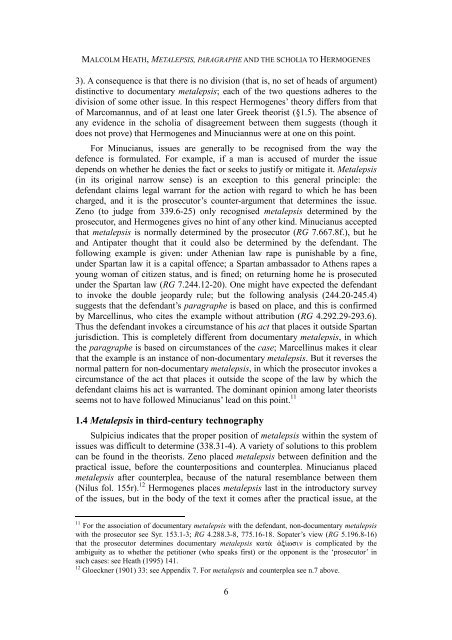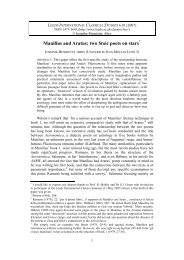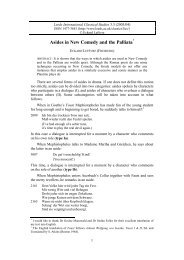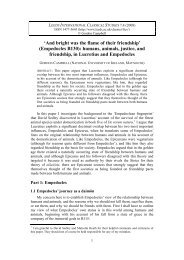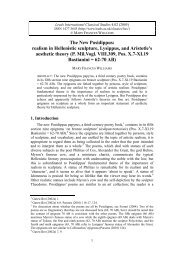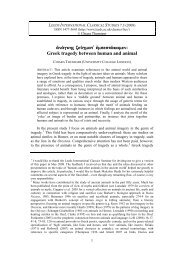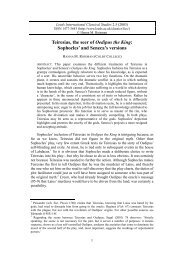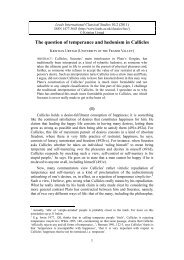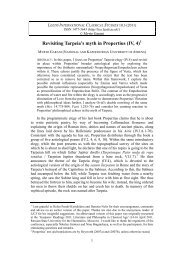Metalepsis, paragraphe and the scholia to Hermogenes - Leeds ...
Metalepsis, paragraphe and the scholia to Hermogenes - Leeds ...
Metalepsis, paragraphe and the scholia to Hermogenes - Leeds ...
Create successful ePaper yourself
Turn your PDF publications into a flip-book with our unique Google optimized e-Paper software.
MALCOLM HEATH, METALEPSIS, PARAGRAPHE AND THE SCHOLIA TO HERMOGENES<br />
3). A consequence is that <strong>the</strong>re is no division (that is, no set of heads of argument)<br />
distinctive <strong>to</strong> documentary metalepsis; each of <strong>the</strong> two questions adheres <strong>to</strong> <strong>the</strong><br />
division of some o<strong>the</strong>r issue. In this respect <strong>Hermogenes</strong>’ <strong>the</strong>ory differs from that<br />
of Marcomannus, <strong>and</strong> of at least one later Greek <strong>the</strong>orist (§1.5). The absence of<br />
any evidence in <strong>the</strong> <strong>scholia</strong> of disagreement between <strong>the</strong>m suggests (though it<br />
does not prove) that <strong>Hermogenes</strong> <strong>and</strong> Minuciannus were at one on this point.<br />
For Minucianus, issues are generally <strong>to</strong> be recognised from <strong>the</strong> way <strong>the</strong><br />
defence is formulated. For example, if a man is accused of murder <strong>the</strong> issue<br />
depends on whe<strong>the</strong>r he denies <strong>the</strong> fact or seeks <strong>to</strong> justify or mitigate it. <strong>Metalepsis</strong><br />
(in its original narrow sense) is an exception <strong>to</strong> this general principle: <strong>the</strong><br />
defendant claims legal warrant for <strong>the</strong> action with regard <strong>to</strong> which he has been<br />
charged, <strong>and</strong> it is <strong>the</strong> prosecu<strong>to</strong>r’s counter-argument that determines <strong>the</strong> issue.<br />
Zeno (<strong>to</strong> judge from 339.6-25) only recognised metalepsis determined by <strong>the</strong><br />
prosecu<strong>to</strong>r, <strong>and</strong> <strong>Hermogenes</strong> gives no hint of any o<strong>the</strong>r kind. Minucianus accepted<br />
that metalepsis is normally determined by <strong>the</strong> prosecu<strong>to</strong>r (RG 7.667.8f.), but he<br />
<strong>and</strong> Antipater thought that it could also be determined by <strong>the</strong> defendant. The<br />
following example is given: under A<strong>the</strong>nian law rape is punishable by a fine,<br />
under Spartan law it is a capital offence; a Spartan ambassador <strong>to</strong> A<strong>the</strong>ns rapes a<br />
young woman of citizen status, <strong>and</strong> is fined; on returning home he is prosecuted<br />
under <strong>the</strong> Spartan law (RG 7.244.12-20). One might have expected <strong>the</strong> defendant<br />
<strong>to</strong> invoke <strong>the</strong> double jeopardy rule; but <strong>the</strong> following analysis (244.20-245.4)<br />
suggests that <strong>the</strong> defendant’s <strong>paragraphe</strong> is based on place, <strong>and</strong> this is confirmed<br />
by Marcellinus, who cites <strong>the</strong> example without attribution (RG 4.292.29-293.6).<br />
Thus <strong>the</strong> defendant invokes a circumstance of his act that places it outside Spartan<br />
jurisdiction. This is completely different from documentary metalepsis, in which<br />
<strong>the</strong> <strong>paragraphe</strong> is based on circumstances of <strong>the</strong> case; Marcellinus makes it clear<br />
that <strong>the</strong> example is an instance of non-documentary metalepsis. But it reverses <strong>the</strong><br />
normal pattern for non-documentary metalepsis, in which <strong>the</strong> prosecu<strong>to</strong>r invokes a<br />
circumstance of <strong>the</strong> act that places it outside <strong>the</strong> scope of <strong>the</strong> law by which <strong>the</strong><br />
defendant claims his act is warranted. The dominant opinion among later <strong>the</strong>orists<br />
seems not <strong>to</strong> have followed Minucianus’ lead on this point. 11<br />
1.4 <strong>Metalepsis</strong> in third-century technography<br />
Sulpicius indicates that <strong>the</strong> proper position of metalepsis within <strong>the</strong> system of<br />
issues was difficult <strong>to</strong> determine (338.31-4). A variety of solutions <strong>to</strong> this problem<br />
can be found in <strong>the</strong> <strong>the</strong>orists. Zeno placed metalepsis between definition <strong>and</strong> <strong>the</strong><br />
practical issue, before <strong>the</strong> counterpositions <strong>and</strong> counterplea. Minucianus placed<br />
metalepsis after counterplea, because of <strong>the</strong> natural resemblance between <strong>the</strong>m<br />
(Nilus fol. 155r). 12 <strong>Hermogenes</strong> places metalepsis last in <strong>the</strong> introduc<strong>to</strong>ry survey<br />
of <strong>the</strong> issues, but in <strong>the</strong> body of <strong>the</strong> text it comes after <strong>the</strong> practical issue, at <strong>the</strong><br />
11 For <strong>the</strong> association of documentary metalepsis with <strong>the</strong> defendant, non-documentary metalepsis<br />
with <strong>the</strong> prosecu<strong>to</strong>r see Syr. 153.1-3; RG 4.288.3-8, 775.16-18. Sopater’s view (RG 5.196.8-16)<br />
that <strong>the</strong> prosecu<strong>to</strong>r determines documentary metalepsis kat¦ ¢x…wsin is complicated by <strong>the</strong><br />
ambiguity as <strong>to</strong> whe<strong>the</strong>r <strong>the</strong> petitioner (who speaks first) or <strong>the</strong> opponent is <strong>the</strong> ‘prosecu<strong>to</strong>r’ in<br />
such cases: see Heath (1995) 141.<br />
12 Gloeckner (1901) 33: see Appendix 7. For metalepsis <strong>and</strong> counterplea see n.7 above.<br />
6


